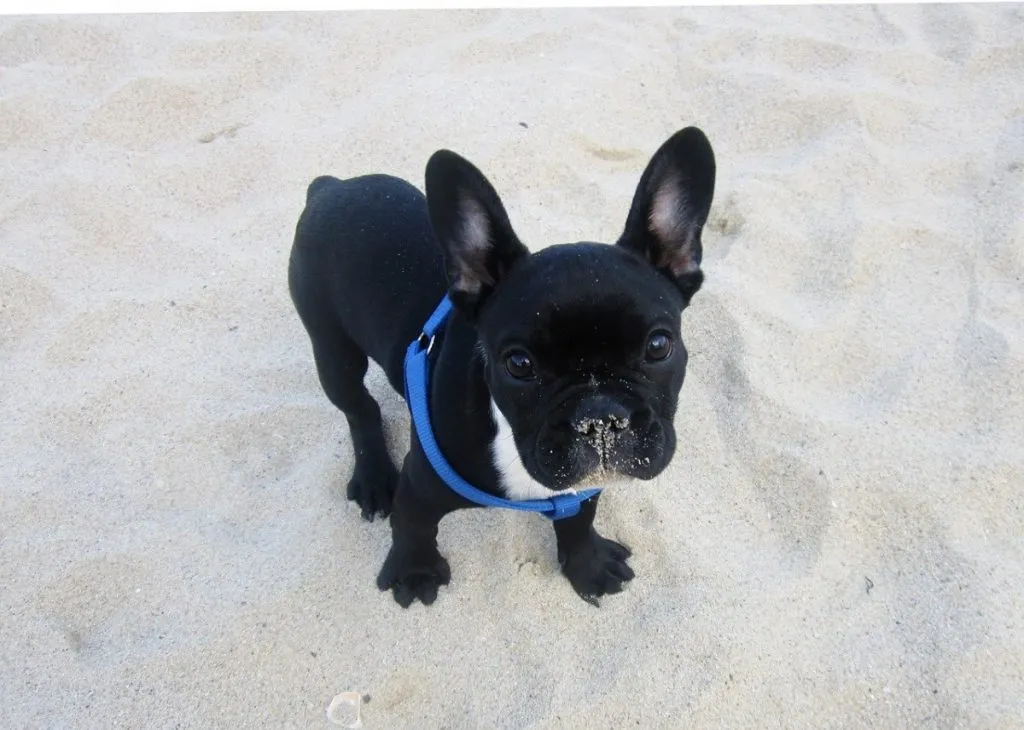
Bringing a pup home is extremely exciting, to say the least. One commonly asked question by most puppy owners is how big their French Bulldog will grow as an adult.
It’s essential to be informed on the expected size of your pup to be able to accord the necessary care and dietary needs. Knowing what your puppy should weigh as an adult also helps you in assessing if you are meetings all the guidelines.
We have covered everything you need to know about the expected weight of your French bulldog in this article. We have dug deep into factors that affect the size of your French bulldog. Whether you are a newbie or a canine enthusiast, you are in the right place. So, why don’t we get started?
A French bulldog is categorized as a small to medium breed dog depending on the genes. The weight of your puppy can be predicted using these common methods:
- Double up- a puppy is expected to double in size when an adult compared to when they were four months old. The formula is a bit different for large breeds. A large breed adult is double the size of a puppy at five months.
- Fourfold- the name of the formula pretty much gives it away. An adult is expected to develop in four folds compared to the puppy. This means that a puppy at eight weeks of age is a quatre the weight of the adult.
- Genes- The weight of your puppy can be predicted using the masses of the dam (mother) and the sire (father). A male puppy will grow to the weight as much as the sire while female pups will grow to the weight of the dam. As they say, like mother like daughter, right?
- Online puppy weight calculators- For comprehensive calculations, you can try a reliable online puppy weight calculator. They are interactive and extremely accurate. You can find out the weight and size of your adult French bulldog on puppyweights.com for a comprehensive way to care for your little canine.
What is the growth rate of a French bulldog?
French bulldogs grow into their fully-fletched sizes between 9-12 months. The size of a French bulldog can be measured in terms of height and length. The length should be taken from the base of their neck to the rear end. The height is determined from their withers. After one year, a French bulldog pup tends to fill up or bulk up. You will notice some significant changes at the age of two, where the puppy will start toning muscles in preparation for adulthood. Your pup may lose some weight, but that is no cause for alarm. After the second year, the puppy will be learner than the previous years.
How to estimate the adult size of a French bulldog
The French bulldog puppy should be measured at precisely eight weeks of age. You should then double the weight and then multiply the answer you get by two. Simply, you can multiply the weight f your puppy at eight weeks by four. To get the final solution, divide the answer from the product by 16.
For instance, assume that the weight of your puppy at eight weeks is 92 ounces (always take the measurements in ounces and for this formula to work) multiply 92 by two and then double the product to get 368 ounces. Dividing this product by 16, you will realize that the average weight of your French bulldog puppy as an adult will be 23 pounds.
What are the factors that determine the growth of a French bulldog?
Genetics is the primary growth determinants of a French bulldog. The size of the adult will directly reflect from that of the dam and sire. There are, however, other environmental factors that have a significant contribution to the diet, healthcare, and even exercise, play a role in deciding how big your little French bulldog will be as an adult.
Diet- a well-breastfed puppy, is likely to flourish into a healthy and robust adult compared to one who was separated from the mother. French bulldog pups should always be allowed to breastfeed adequately at least for the first one month for fast growth.
Nutrition- what you feed your puppy after getting weaned also affects their growth. A weaned French bulldog pup should be fed a healthy, high-quality diet that compensates the nutrients they are missing from their mother. Low-quality foods and underfeeding may result in stunted growth. The size of the adult may be affected.
Exercise- obesity should be distinguished from healthy growth. A puppy who is overfed and under-exercised may put on overweight, which results in an unhealthy adult. A puppy should be taken out to exercise after being fed well to grow into a healthy, well-sized adult.
Medical conditions- a sickly puppy may result in smaller adults compared to pups who grow up healthy and strong. Puppies who experience malnutrition or are born from malnutrition mothers are likely to develop into smaller dogs too.

Does the litter size affect the size of a puppy and an adult?
Dogs can have anywhere between one to a dozen puppies in one birth. The largest recorded litter size was a whopping 24. According to the American kennel club, the size of the litter depends on the breed of the dog. Smaller breeds equal smaller litter while bigger breeds equal larger litter.
When you think about it, it makes sense for a Russian Toy not to have the same litter size as a Great Dane. Smaller dog breeds have petite bodies compared to their larger counterparts. The space they have in their wombs to carry pups is therefore limited. A small breed can have fur pups tops in one birth. Bigger breeds are usually way larger and have ample space to hold many pups in their womb. A large breed dog can carry over ten puppies, which is a big litter.
The breed size also has an impact on the size of the puppy at birth and, as an adult. Smaller breeds beget small puppies while big breeds result in bigger newborns despite the litter size.
Does litter size contribute to the size of the puppy?
The size of a newborn puppy, in most cases, has nothing to do with the litter size. A bigger litter does not automatically result in smaller puppies. One factor that contributes to the size of the puppy is the breed, as we have discussed.
The health of the dam or mother also has a significant influence on the health of the puppy. It can be rather surprising to find healthy and bigger newborns from a bigger litter compared to a smaller litter from the same breed size. The health of the mother before and during birth determines the health of the puppies to be born.
When a puppy is in the womb of the mother, it relies on the nutrients taken by the mother. If the mother is not eating well, the puppies will also be affected. It’s, therefore, crucial to ensure that your dog is always eating well, pre, and during pregnancy. You should provide them with the right diet to supply nutrients to the unborn pups.
Health problems related to litter size
The size of the litter does not necessarily affect the size of the puppies. However, there are a few problems associated with the litter size.
When a dog attempts to carry a bigger litter than their uterus can handle, say a small breed attempts to carry seven liters, the health of the mother, and that of the puppies can be put on the line. In adverse conditions, birth, the mother and puppies may lose their life.
Bigger litters also pose the danger of malnutrition for the mother since all nutrients are drawn up by the puppies. The puppies in the middle of the womb are also at threat of malnutrition.
Bigger litter sizes also pose the danger of stillbirths and runts. A mother carrying too many litters can also go into premature whelping, which does not only pose a problem to the puppies but also the dog parents.
How to predict the litter size
It’s challenging to accurately predict the size of a litter, but factors such as age and the mother’s health have an impact. A healthy mother is likely to carry a bigger litter than an obese or mother with other medical conditions. Also, younger dogs carry bigger litters than older dogs.
The breed is not an accurate way of predicting the litter size as some dogs end up defying the odds. A dog may experience a relatively bigger litter size than others in the breed.
Conclusion
Litter size has no effect or contribution to the size of the newborn or adult. The pup’s breed, genes, and mother’s nutrition during and before pregnancy are the factors that determine the size the adult will flourish, too, as an adult.
We cannot guarantee the weight and size of a mature puppy, but we have provided a tool for that purpose. When this tool is coupled with keen observation of the genes, bone structure, and other factors, you can get close to the correct prediction.
